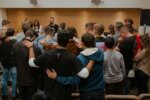Clearly, the modern church is in crisis. Regardless of denominational affiliation (or none at all), there are warring factions threatening to tear the church, as we know it, apart.
These factions most often appear in the form of two generations struggling to find enough common ground to keep meeting together under one roof. This battle has led to numerous church splits, restructured programming, frustrated church leaders and wounded sheep.
Is this a new problem or simply a revisited one? Does it indicate a sovereign move of the Spirit or the byproduct of a culture spinning out of control? And the big question is: How do evolving Gen-X leaders confront this crisis and find God’s will to the other side?
The answers to these questions lie hidden in the timeless wisdom of God’s Word. Specifically, the book of Ruth—viewed prophetically—offers some key insights to guide our course.
The Time of Judges
Historically, the events of Ruth occur during the time period recorded in the book of Judges. This period marked the 300 years following Israel’s initial conquest of Canaan under the dynamic leadership of Joshua.
When Joshua and his generation died, the Israelites lost sight of their vision to complete the takeover of Canaan. They compromised the borders God had identified for them and established unholy treaties with neighboring pagans.
Over time, these treaties proved to be the snare Joshua and Moses warned they would be (Deut. 7:16). Instead of experiencing the promised prosperity they had waited more than 450 years to enjoy, the Israelites found their lives to be a constant struggle of famine and warfare.
Seven times the Israelites fell into compromise, suffered, cried out for deliverance and were met with God’s mercy. But their hearts never changed. They never learned to seek God for themselves, and they continued to rely on external sources of holiness and deliverance.
One Representative Family
At this point, the camera zooms in on one representative family—hence, the book of Ruth. This book tells the story of Elimelech and Naomi who, in a period of famine, decided to leave God’s ways (represented by the land) and seek the world for help (Ruth 1:1-2). Their decision ultimately resulted in the premature death of both Elimelech and his two sons.
By middle age, Naomi was left with nothing but one loyal daughter-in-law and a land deed in Bethlehem. The book opens with the account of Naomi’s returning home.
Naomi’s daughter-in-law is named Ruth, which means “friend.” Despite Naomi’s bitter attitude and insistent orders to return home, Ruth won’t leave her.
She won’t forsake the relationship or give up on the God Naomi once professed. As bad as their current circumstances appeared, Ruth believed for a better day.
A great friendship evolved from Ruth’s persistence. In fact, Ruth and Naomi’s friendship stands out among scriptural relationships as one of the greatest examples of Christlike love in the Bible. What’s more, their relationship symbolically portrays the future development of the bride of Christ.
Two Women, One Bride
Together, Ruth and Naomi represent the bride of Christ. Ruth represents new believers and Gentiles; Naomi represents older believers and Jews.
The book of Ruth appropriately begins with Naomi’s story. Elimelech (whose name means “one intended by God to rule”) and Naomi once walked with God.
Their faith grew weary in hardship, however, and as the result of tragedy, Naomi’s faith faltered. The book opens with her proclaiming to the women of Jerusalem, “The Lord has afflicted me, and I’m bitter” (Ruth 1:20-21).
Among older believers and certainly among Jews, there are those whose faith has faltered in light of tragedy. No matter how strongly we believe, life’s circumstances can and do affect our hope in God.
From time to time, we all need reassurance that God still loves us and will help us despite the circumstances He may have allowed in our lives. Such is the state of Naomi at the beginning of the book of Ruth.
To help Naomi, God brings alongside her a young believer from a pagan background. Ruth was a Moabite, a descendant of one of Israel’s greatest enemies. The Moabites were relatives of Israel, but they were worldly and perverse (Jer. 48).







Leave a Comment
You must be logged in to post a comment.